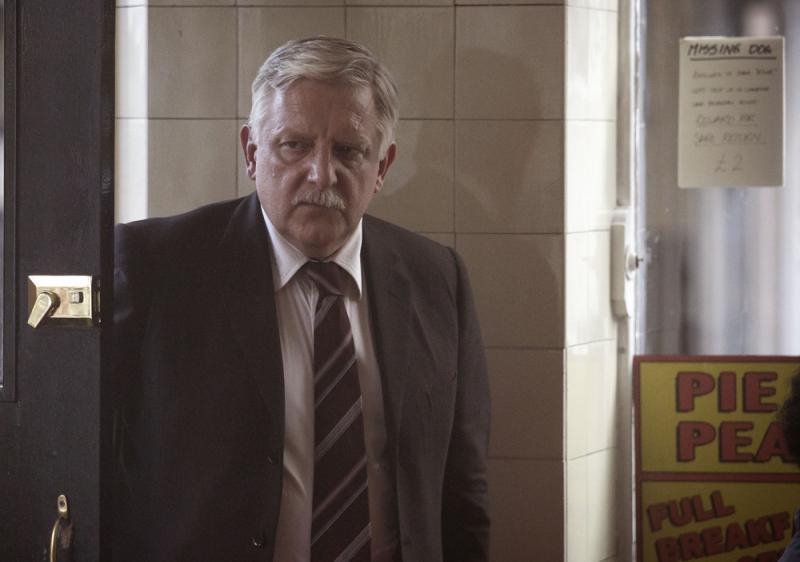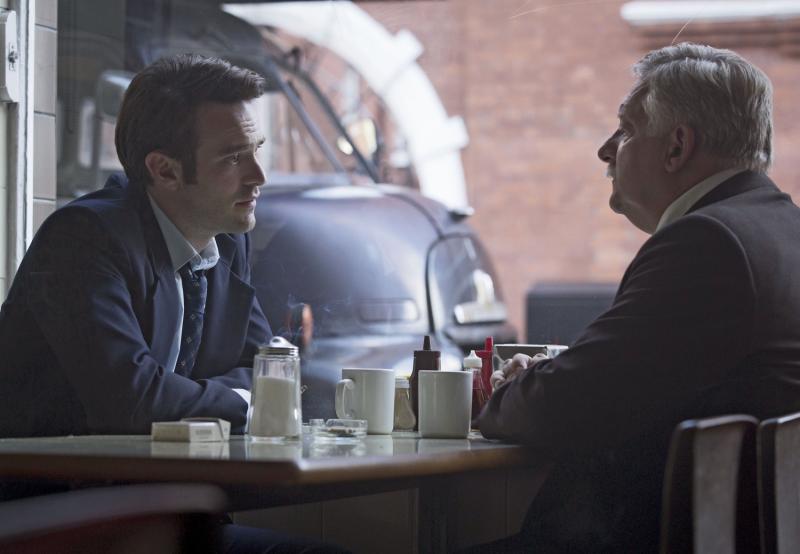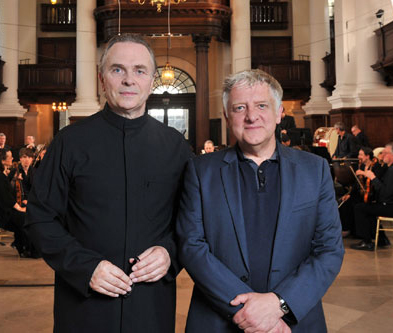10 Questions for Actor Simon Russell Beale | reviews, news & interviews
10 Questions for Actor Simon Russell Beale
10 Questions for Actor Simon Russell Beale
Actor for all seasons delves into Cold War spookery in 'Legacy'

It’s difficult to give Simon Russell Beale a brief introduction, so encyclopedic is his list of stage and screen acting credits. He has cruised masterfully through Shakespeare, Ibsen, Chekhov, the Restoration playwrights, Shaw and Pinter, and recently camped it up madly in a revival of Peter Nichols’s Privates on Parade. He has been such a mainstay of the National Theatre that the building may have subsided into the Thames without him.
On screen, he has appeared in such diverse fare as adaptations of Persuasion, An Ideal Husband and Rattigan’s The Deep Blue Sea, and his portrayal of Falstaff in BBC Two’s 2012 series of Shakespeare's history plays, The Hollow Crown, won him a Bafta. Also a keen classical music buff, he has presented the series Sacred Music and Symphony for BBC Four.
This Thursday, Russell Beale makes his contribution to the BBC’s Cold War season as the MI6 spymaster Hookey, in the one-off espionage drama Legacy. It has been adapted by Paula Milne from Alan Judd’s novel, and tells the story of fledgling agent Charles Thoroughgood (Charlie Cox), who is staggered to learn that his own father may have been hiding some murky secrets. Meanwhile Thoroughgood is trying to unravel a Russian sabotage ring operating in a bleak 1970s Britain afflicted with power cuts, the three-day week and atrocious British Leyland cars. Early one morning over a cup of BBC coffee, Russell Beale delved into the clandestine world of spookery.
That's another thing that's interesting about the spy genre, the sheer ludicrousness of a lot of things that were done
ADAM SWEETING: Before appearing in Legacy, you played John le Carré’s George Smiley for Radio 4?
SIMON RUSSELL BEALE: Yes, I did. I don’t know whether the Legacy team will particularly appreciate me mentioning le Carré, but it’s part of the tradition, isn't it? It was the most extraordinary achievement actually, because we spent a year and a half recording all the le Carré books and and I don't think there was a single change of actor playing any of the characters. Well, there was one tiny one, much to that actor’s irritation, so people were sort of devoted to the project and they did it for a very long time. The sheer logistics of it were very impressive. But what was wonderful for me was I had to read eight le Carré books and I'd never really read them. I knew the Alec Guinness television versions when I was a child, which links with Legacy actually because it was the same period. He's brilliant, absolutely brilliant. There are a couple of books in there that are just masterpieces. In fact one of them was where George Smiley wasn't involved very much, but The Spy Who Came In From the Cold and The Looking Glass War I think are genuine literary masterpieces.
Interestingly enough, linking it with the National Theatre 50th anniversary is that one of the pieces is a bit from Copenhagen, Michael Frayn’s play about walking across Germany just after the war. Literally days after the war, and the heartbreak of this German physicist walking through a shattered civilisation. That idea threads through a lot of Frayn's work and through all of le Carré's George Smiley books, and it’s in Legacy as well I think. It’s not specifically about Germany, but it was set in a period where we were still - and we still are, I suppose - absorbing the implications of this collapsed civilisation, and a lot of people were traumatised obviously. People who love German culture. Richard Strauss, for instance, writing his stuff in his Bavarian mansion. I find that unbearably moving. Because Smiley is a German expert, you forget that from the various film versions, but German literature is his speciality. When I was doing the sacred music and symphony series for BBC Four, a lot of my time was spent in the former East Germany, sitting in Weimar or Leipzig or Wittenberg and thinking “this is an absolute cradle of Western European civilisation.” We in this country have largely wiped that idea of Germany away now. (Pictured below, Simon Russell Beale as Hookey with Charlie Cox as Charles Thoroughgood)
 In Legacy, was the idea in the film of the Russians burying caches of sabotage materials in Britain based in reality?
In Legacy, was the idea in the film of the Russians burying caches of sabotage materials in Britain based in reality?
Well apparently yes, I believe it’s true essentially. That's another thing that's interesting about the whole spy genre, the sheer physical ludicrousness of a lot of the things that were done. Wasn't there a story about rocks in Moscow fairly recently, containing hidden microphones or something? You think they can't possibly be serious, they can't be burying caches of explosives in sand dunes on golf courses. It feels very amateur. It's an acknowledgment of the idiosyncracies of human psychology too, I think, that people behave in odd ways and therefore you’re playing a game where you’re predicting human behaviour which is necessarily unpredictable. So therefore you end up doing peculiar things like burying caches in dunes on the assumption that nobody is going to find them.
Your father was a general, wasn’t he? Did that give you some insight into the Establishment mindset?
Well, he was a doctor-general so he wasn’t what we called in our family "big Army", he wasn't a soldier. But yes, he ended up as a general and he was in charge of the medicine for the three forces at the end of his career, so he was an important man. But that's part of my life, the Army life. I was born in the Far East and we spent my adolescence in Germany, so I suppose I was part of the Cold War effort. But although my father was a doctor he never really felt like the military establishment, and I think that's probably still true of the Army, that the doctors are sort of a slightly eccentric wing of it. They’re an amazing part of the military machine, but I remember when dad achieved field rank and we were meeting the big soldiers, they were a different breed to the doctors so I never felt as if we were part of the miltary establishment at all. We were brought up in Germany as adolescents, and I remember going to visit Berlin, which of course was in the Eastern Bloc. Dad had to drive from the border of West Germany to Berlin in a certain amount of time and for children that was incredibly exciting - will dad be too slow or too fast, because he had to arrive within a particular window of time? Just driving across eastern Germany, it felt very weird. I was 13, seeing the Berlin Wall and hearing about people escaping under the barriers and so on, and for an adolescent boy it was rather thrilling. But the thing about Legacy, the first thing that attracted me to the story - do you remember the power cuts in Britain in the Seventies? I remember all that. It could be thrilling for a child, doing your homework by candlelight, it was all thrilling.
We worry about the state of the nation now, but at that time it really seemed to be falling apart?
Yes, and the Legacy script came at just the point when I went to see a play called This House, which was about the political landscape between 1974 and ’79 which was sort of exactly the beginning of the period of Legacy. And it was brilliant. It was the sort of thing where you thought, “how on earth is this going to be theatrically interesting?”, and it was thrilling. Obviously the play concentrated five years into a very small period, but it was the Lib-Lab Pact, it was Jeremy Thorpe, it was [Labour MP and spy] John Stonehouse, it just went on and on and on, and Big Ben stopping of course. It had never happened before, or maybe just once... highly symbolic! Then we were building up to the Winter of Discontent, the rubbish piling up in the streets, and the rats running in the streets, and unburied corpses, and Margaret Thatcher coming in. I remember all that very clearly, and it was sort of chaos. It was grim (Russell Beale as Falstaff in The Hollow Crown, pictured below).
So  I went away from the play and I thought, “I'll read up about this.” Dominic Sandbrook has written a couple of books about 20th-century British history, and his one on the Seventies had just come out so I sat down and absolutely devoured it. Because it's the missing unglamorous decade, isn't it? Everything was brown and orange. Duvets started coming in, and duvet covers were always brown and purple and orange, weren't they, and horrible. In swirls. At least, the ones we had were. There were things I'd completely forgotten, like how little television there was, and how few channels there were and all that sort of stuff. I just thought it would be marvellous to do something set in that period because it was an incredibly dowdy time. That was also a continuum in the spy genre, the sheer ordinariness and the plodding dreariness of the process. I think that's fascinating too.
I went away from the play and I thought, “I'll read up about this.” Dominic Sandbrook has written a couple of books about 20th-century British history, and his one on the Seventies had just come out so I sat down and absolutely devoured it. Because it's the missing unglamorous decade, isn't it? Everything was brown and orange. Duvets started coming in, and duvet covers were always brown and purple and orange, weren't they, and horrible. In swirls. At least, the ones we had were. There were things I'd completely forgotten, like how little television there was, and how few channels there were and all that sort of stuff. I just thought it would be marvellous to do something set in that period because it was an incredibly dowdy time. That was also a continuum in the spy genre, the sheer ordinariness and the plodding dreariness of the process. I think that's fascinating too.
Did you identify with Hookey, your character in Legacy, in any way?
He's so remote, so identifying was not necessarily an issue actually. Also because I'm not quite sure what his game was. I think it's left open-ended at the end. I thought, “Shall I make some decisions about what he's really telling Charles Thoroughgood about his father?” And I suspect what he's telling Charles is not true, but then I thought, “I don’t need to decide, I don’t want to decide, it’s such a front.” But talking about the Second World War, I thought this is a man who probably might even have fought, he might have been old enough to have fought as a 20-year-old. And certainly in the Cold War he would have seen things and suffered things that were not very pleasant. It was all so battened down that you have no idea about a Mrs Hookey, or what he eats or... well, we see him eat a fried breakfast but that's about it.
Where did you get that idea of having Hookey snap off the filters of his cigarettes?
That was the director, Pete Travis. It was hell with those herbal cigarettes, urgh, doing take after take, horrible. I think in the book he's a pipe smoker, and in fact it wasn’t my decision to get rid of the pipe but I was very pleased to get rid of it because I thought that had too many wrong associations, and I wanted something grubbier really. I kept on thinking he learned to smoke in Russia, where they had those terrible cigarettes in the Cold War. The hit you got from a Western filter cigarette just wasn't good enough, so you had to snap off the filter (Russell Beale with Rachel Weisz in The Deep Blue Sea, pictured below).
 Hookey reminded me a little of William Towers, the Home Secretary, who you played in Spooks?
Hookey reminded me a little of William Towers, the Home Secretary, who you played in Spooks?
Well, he's a bit of a twit, is Towers. I was very fond of Towers, but he doesn’t have Hookey's grimness, does he? He's a bit more clubbable. I loved the fact in Spooks that Towers seemed to do everything himself. He never seemed to talk to the Prime Minister. He'd say, “There's a plane attacking Britain,” and you’d think the least he could do was phone the Prime Minister and say, “Prime Minister, there's a plane attacking Britain.” But it seemed to be all his own responsibility. But he is a bit more clubbable, I think, and also fly-by-night, to use the famous phrase, being a politician. Patriotism's an interesting thing, isn’t it? Always threading through the spy genre is the idea of defining patriotism. I love this idea that everything looks so grim, and the idea of being patriotic for this funny little run-down country is... rather grand, actually. It’s also negotiating our loss of empire, all that’s piled into that period too. It's sort of what Skyfall, the James Bond film, even started nodding towards I thought, a sort of sense of failure rather than success, with an ageing Bond. Perhaps that idea is fashionable now, I don't know.
Is it difficult for you to switch between acting for stage and television?
What was weird about playing Shakespeare for TV in The Hollow Crown was that I didn’t have to. It straddled both disciplines. But yes of course, I'm very aware of it. The first few moments of filming with a new team are always a little bit self-conscious. It’s a weird thing - just speaking, the pitch of it, the volume of it, the accuracy of it... All those sort of things feed in and it takes a bit of time to get. But with the Shakespeare I relaxed very quickly because it was a type of technique that I'd been trained to do. A thing like Legacy I find actually more difficult to begin with, it's just that presentation of something simply. But then you've got Geraldine James beside you half the time and you think, “Well that's fine, I'll just watch her and see what she does.” But no, I'm still not hugely confident on screen, though I loved Pete Travis’s way of directing Legacy. I think it’s quite rough-edged in terms of film technique (Russell Beale with Sir Mark Elder in Symphony, pictured below).
 I always think one of the pitfalls of TV or film acting is that all your best bits could just end up on the cutting-room floor, and you have no control over it.
I always think one of the pitfalls of TV or film acting is that all your best bits could just end up on the cutting-room floor, and you have no control over it.
I did a day's filming last week with James Corden. Just one day, and the director said, “Do you want to have a look at it?” I said, “No, I'd prefer not to, but I know I should because I'd learn how to act on screen.” He said, “You know something? I’ve never ever had anybody look at themselves on screen and then go on and do better, so I'm rather relieved you're not looking at yourself.” It's always horrific because some shots are so unflattering, but that's fine - Hookey isn’t a glamourpuss. He's not a pin-up. But there was one shot where I thought, “Oooh! that was really unflattering.” But I avoid watching myself like the plague. I still haven’t watched Legacy. I haven’t seen The Hollow Crown all the way through. And eventually I’ll catch up with The Deep Blue Sea, which I still haven't seen.
You were very good in that.
Oh, thank you!
- Legacy is on BBC Two at 9pm on 28 November
Share this article
The future of Arts Journalism
You can stop theartsdesk.com closing!
We urgently need financing to survive. Our fundraising drive has thus far raised £49,000 but we need to reach £100,000 or we will be forced to close. Please contribute here: https://gofund.me/c3f6033d
And if you can forward this information to anyone who might assist, we’d be grateful.

Subscribe to theartsdesk.com
Thank you for continuing to read our work on theartsdesk.com. For unlimited access to every article in its entirety, including our archive of more than 15,000 pieces, we're asking for £5 per month or £40 per year. We feel it's a very good deal, and hope you do too.
To take a subscription now simply click here.
And if you're looking for that extra gift for a friend or family member, why not treat them to a theartsdesk.com gift subscription?

Add comment